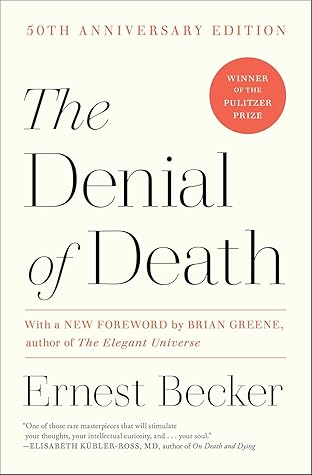More on this book
Community
Kindle Notes & Highlights
The third strand. Since the terror of death is so overwhelming we conspire to keep it unconscious.
We repress our bodies to purchase a soul that time cannot destroy; we sacrifice pleasure to buy immortality; we encapsulate ourselves to avoid death. And life escapes us while we huddle within the defended fortress of character.
Society provides the second line of defense against our natural impotence by creating a hero system that allows us to believe
that we transcend death by participating in something...
This highlight has been truncated due to consecutive passage length restrictions.
Making a killing in business or on the battlefield frequently has less to do with economic need or political reality than with the need for assuring ourselves that we have achieved something of lasting worth.
Lasting worth - the quest for something immortal. That is the reason for the quest - to have something forever. The quest is not for a temporary object. It is implicit this is forever
The root of humanly caused evil is not man’s animal nature, not territorial aggression, or innate selfishness, but our need to gain self-esteem, deny our mortality, and achieve a heroic self-image.
From the beginning of time, humans have dealt with what Carl Jung called their shadow side—feelings of inferiority, self-hate, guilt, hostility—by
by projecting it onto an enemy.
And, the more blood the better, because the bigger the body-count the greater the sacrifice for the sacred cause, the side of destiny, the divine plan.
No doubt, one of the reasons Becker has never found a mass audience is because he shames us with the knowledge of how easily we will shed blood to purchase the assurance of our own righteousness.
in glory keeps us from acknowledging that the emperor has no clothes.
The science of man has shown us that society will always be composed of passive subjects, powerful leaders, and enemies upon whom we project our guilt and self-hatred.
This knowledge may allow us to develop an “objective hatred” in which the hate object is not a human scapegoat but something impersonal like poverty, disease, oppression, or natural disasters. By making our inevitable hatred intelligent and informed we may be able to turn our destructive energy to a creative use.
The existential hero who follows this way of self-analysis differs from the average person in knowing that he/she is obsessed. Instead of hiding within the illusions of character, he sees his impotence and vulnerability.
To be sure, primitives often celebrate death—as Hocart and others have shown—because they believe that death is the ultimate promotion, the final ritual elevation to a higher form of life, to the enjoyment of eternity in some form. Most modern Westerners have trouble believing this any more, which is what makes the fear of death so prominent a part of our psychological make-up.
God is dead so without God we are left without the belief death is a promotion ...
So we fear death... and without God we become anxious about death
The man of knowledge in our time is bowed down under a burden he never imagined he would ever have:
For centuries man lived in the belief that truth was slim and elusive and that once he found it the troubles of mankind would be over.
I mean that, usually, in order to turn out a piece of work the author has to exaggerate the emphasis of it, to oppose it in a forcefully competitive way to other versions of truth; and he gets carried away by his own exaggeration, as his distinctive image is built on it.
I have been trying to come to grips with the ideas of Freud and his interpreters and heirs, with what might be the distillation of modern psychology—and now I think I have finally succeeded.
we like to be reminded that our central calling, our main task on this planet, is the heroic*
One of the key concepts for understanding man’s urge to heroism is the idea of “narcissism.”
If we care about anyone it is usually ourselves first of all.
It is one of the meaner aspects of narcissism that we feel that practically everyone is expendable except ourselves.
Freud’s explanation for this was that the unconscious does not know death or time: in man’s physiochemical, inner organic recesses he feels immortal.
We have learned, mostly from Alfred Adler, that what man needs most is to feel secure in his self-esteem.
In childhood we see the struggle for self-esteem at its least disguised.


